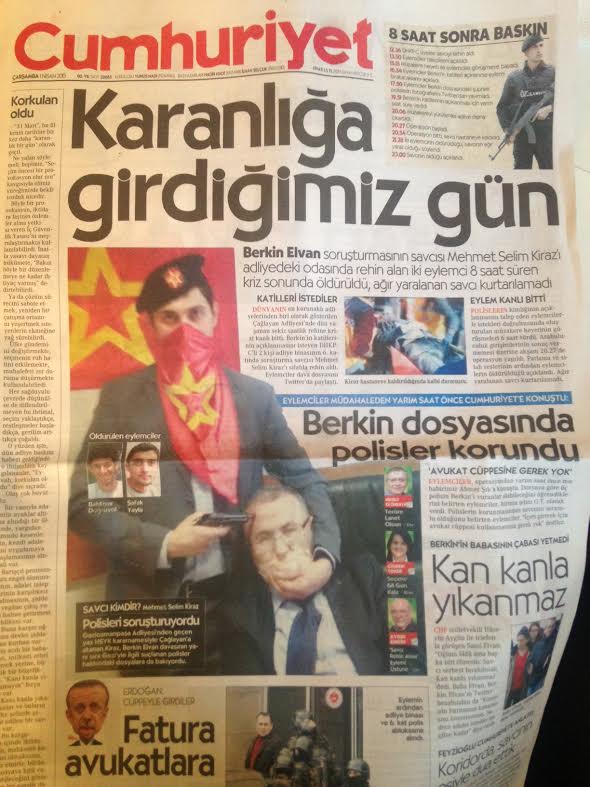
Last week, on March 31st, two persons associated with the Revolutionary People’s Liberation Party-Front (DHKP/C), a Marxist-Leninist political party currently being suppressed in Turkey, stormed the courthouse office of prosecutor Mehmet Salim Kiraz. Mehmet was investigating the near-three year old case of Berkin Elvan.
Elvan was a fifteen years old. He ventured out into the street one day to buy food. The police shot him in the head with a tear gas canister. Elvan died after spending time in a year-long coma. The killing of Elvan sparked protests, particularly in the context of the repressive Erdoğan government; Erdoğan accused Elvan of being a “member of a terrorist organization.” The protests did not result in any consequences for the police officers responsible.
To this day there has been no accountability. Mehmet was the prosecutor assigned to investigate the case of Elvan. In short, Mehmet was the agent of the criminal justice system who – and we see this all around the world – rubber stamps police homicides with legal approval. When prosecutors fail to bring charges against law enforcement officers who kill people, this is the kind of person they tend to be: Mehmet Salim Kiraz.
I’m not any kind of expert on the Revolutionary People’s Liberation Party, but this article is not about the DHKP anyway. All the better, perhaps, because the DHKP is on that list of political excommunicates dubbed a “terrorist organization” by the EU, USA and Turkey. No one wants to be accused of pulling a Dieudonne-esque “Charlie Coulibaly.” (And I hesitate to even learn more about the DHKP to form an educated opinion – an example of how the law stifles political expression by intimidating people into self-censorship.)
But since the DHKP’s “terrorist organization” status makes any discourse that isn’t one-sided shunning the equivalent of saying “Voldemort” in the Harry Potter universe, let’s look at an interview with the two militants who took the prosecutor hostage. And let’s draw some parallels between our own cultures, our own law enforcement, police violence and that of Turkey. (If you’re in Turkey you’re probably not reading this anyway: Turkey censored the entire WordPress domain specifically because of the same photo posted here.)
What happened is not unique to Turkey, dictatorships, or regimes myopically called repressive by the West. It’s the exact same thing we see on a regular basis in our own countries. In Western nations where the police routinely kill people, such as the USA, officers rarely face legal repercussions. In EU states where police homicides are less common, it is still the case that when they do happen the police are not held accountable. Protests are still violently suppressed. Peaceful demonstrators are still beaten and wounded.
The end result is that citizens, the people on the street, feel that they can’t find legal solutions. And they’re right. They’re forced to commit acts of “crime,” sometimes dubbed acts of “terrorism,” to secure justice. In many cases, the same act treated legitimately if performed by state agents (an “arrest”) is a grave crime if committed by citizens (a “kidnapping”). As Max Stirner put it: “The state calls its own violence law, but that of the individual, crime.” The more repressive the government, the less legal recourse the community has.
We’re used to seeing the goals of “terrorist” organizations presented as outlandish. For example, to extend a religious theocracy over an entire region, or to drive an entire people “into the sea.” This gives the appearance of an ideology or a group that cannot be compromised with. The guilt by association effect of being dubbed a “terrorist,” then, means that any demands by persons with this label are immediately dismissed as outlandish. Even if they’re completely reasonable.
The demands of these two militants were, in this case, completely reasonable. You can read the interview above, but summed up they were this: disclosure of the names of the four police officers involved in the Elvan’s killing, a trial for the four police officers in a popular court, and a deadline of three hours for the Police Chief and Deputy Chief Prosecutor to respond. The failure of the Turkish state to acquiesce is not an example of “refusing to negotiate with terrorists.” It’s refusing to negotiate with reason. The Turkish state is responsible for the death of Berkin Elvin and Mehmet Salim Kiraz.
The demands are, ideally, what one would expect from any democratic justice system. Yet, this is not what exists in Turkey. It doesn’t exist in London, nor in New Hampshire, nor in Athens. The demands were simply requesting what we’re taught is a virtue, what we’re indoctrinated to believe that we have a right to. They’re reminiscent of the demands that the much-revered “Founding Fathers” of the United States made of Great Britain. (Incidentally, demands they made while also committing terrorist violence against British agents preceding and during the American War of Independence.)
This is not something that we need to excuse or justify. It’s the natural result of injustice in society, specifically related to violence. If the state is unable to turn some degree of justice upon itself when it commits acts of violence (it isn’t, and doesn’t), there will always be people who pick up arms and seek justice themselves. (Justice, in this case, being used the way the militants used the term.) It’s a cycle of violence. It may vary from more to less extreme, depending on the state and the level of unaccountability, but it will always emerge at some level due to the existence of a police class sanctioned with a role consisting primarily of committing violent acts.